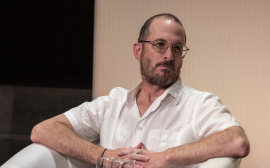Description
IBM Watson Health is a digital tool that helps clients facilitate medical research, clinical research, and healthcare solutions[buzzword], through the use of artificial intelligence, data, analytics, cloud computing, and other advanced information technology. It is a division of the International Business Machines Corporation, (IBM), an American multinational information technology company headquartered in Armonk, New York.
IBM began in 1911, founded in Endicott, New York, as the Computing-Tabulating-Recording Company (CTR) and was renamed "International Business Machines" in 1924. IBM is incorporated in New York.
IBM produces and sells computer hardware, middleware and software, and provides hosting and consulting services in areas ranging from mainframe computers to nanotechnology. IBM is also a major research organization, holding the record for most U.S. patents generated by a business (as of 2019) for 26 consecutive years. Inventions by IBM include the automated teller machine (ATM), the floppy disk, the hard disk drive, the magnetic stripe card, the relational database, the SQL programming language, the UPC barcode, and dynamic random-access memory (DRAM). The IBM mainframe, exemplified by the System/360, was the dominant computing platform during the 1960s and 1970s.
Advancements
In healthcare, Watson's natural language, hypothesis generation, and evidence-based learning capabilities are being investigated to see how Watson may contribute to clinical decision support systems and the increase in artificial intelligence in healthcare for use by medical professionals. To aid physicians in the treatment of their patients, once a physician has posed a query to the system describing symptoms and other related factors, Watson first parses the input to identify the most important pieces of information; then mines patient data to find facts relevant to the patient's medical and hereditary history; then examines available data sources to form and test hypotheses; and finally provides a list of individualized, confidence-scored recommendations. The sources of data that Watson uses for analysis can include treatment guidelines, electronic medical record data, notes from healthcare providers, research materials, clinical studies, journal articles and patient information. Despite being developed and marketed as a "diagnosis and treatment advisor", Watson has never been actually involved in the medical diagnosis process, only in assisting with identifying treatment options for patients who have already been diagnosed.
In February 2011, it was announced that IBM would be partnering with Nuance Communications for a research project to develop a commercial product during the next 18 to 24 months, designed to exploit Watson's clinical decision support capabilities. Physicians at Columbia University would help to identify critical issues in the practice of medicine where the system's technology may be able to contribute, and physicians at the University of Maryland would work to identify the best way that a technology like Watson could interact with medical practitioners to provide the maximum assistance.
In September 2011, IBM and WellPoint (now Anthem) announced a partnership to utilize Watson's data crunching capability to help suggest treatment options to physicians. Then, in February 2013, IBM and WellPoint gave Watson its first commercial application, for utilization management decisions in lung cancer treatment at Memorial Sloan–Kettering Cancer Center.
IBM announced a partnership with Cleveland Clinic in October 2012. The company has sent Watson to the Cleveland Clinic Lerner College of Medicine of Case Western Reserve University, where it will increase its health expertise and assist medical professionals in treating patients. The medical facility will utilize Watson's ability to store and process large quantities of information to help speed up and increase the accuracy of the treatment process. "Cleveland Clinic's collaboration with IBM is exciting because it offers us the opportunity to teach Watson to 'think' in ways that have the potential to make it a powerful tool in medicine", said C. Martin Harris, MD, chief information officer of Cleveland Clinic.
In 2013, IBM and MD Anderson Cancer Center began a pilot program to further the center's "mission to eradicate cancer". However, after spending $62 million, the project did not meet its goals and it has been stopped.
On February 8, 2013, IBM announced that oncologists at the Maine Center for Cancer Medicine and Westmed Medical Group in New York have started to test the Watson supercomputer system in an effort to recommend treatment for lung cancer.
On July 29, 2016, IBM and Manipal Hospitals (a leading hospital chain in India) announced the launch of IBM Watson for Oncology, for cancer patients. This product provides information and insights to physicians and cancer patients to help them identify personalized, evidence-based cancer care options. Manipal Hospitals is the second hospital in the world to adopt this technology and first in the world to offer it to patients online as an expert second opinion through their website. Manipal discontinued this contract in December 2018.
On January 7, 2017, IBM and Fukoku Mutual Life Insurance entered into a contract for IBM to deliver analysis to compensation payouts via its IBM Watson Explorer AI, this resulted in the loss of 34 jobs and the company said it would speed up compensation payout analysis via analysing claims and medical record and increase productivity by 30%. The company also said it would save ¥140m in running costs.
It is said that IBM Watson will be carrying the knowledge-base of 1000 cancer specialists which will bring a revolution in the field of healthcare. IBM is regarded as a disruptive innovation. However the stream of oncology is still in its nascent stage.
Several startups in the healthcare space have been effectively using seven business model archetypes to take solutions based on IBM Watson to the marketplace. These archetypes depends on the value generate for the target user (e.g. patient focus vs. healthcare provider and payer focus) and value capturing mechanisms (e.g. providing information or connecting stakeholders).
In 2019 Eliza Strickland calls "the Watson Health story a cautionary tale of hubris and hype" and provides a "representative sample of projects" with their status.

























